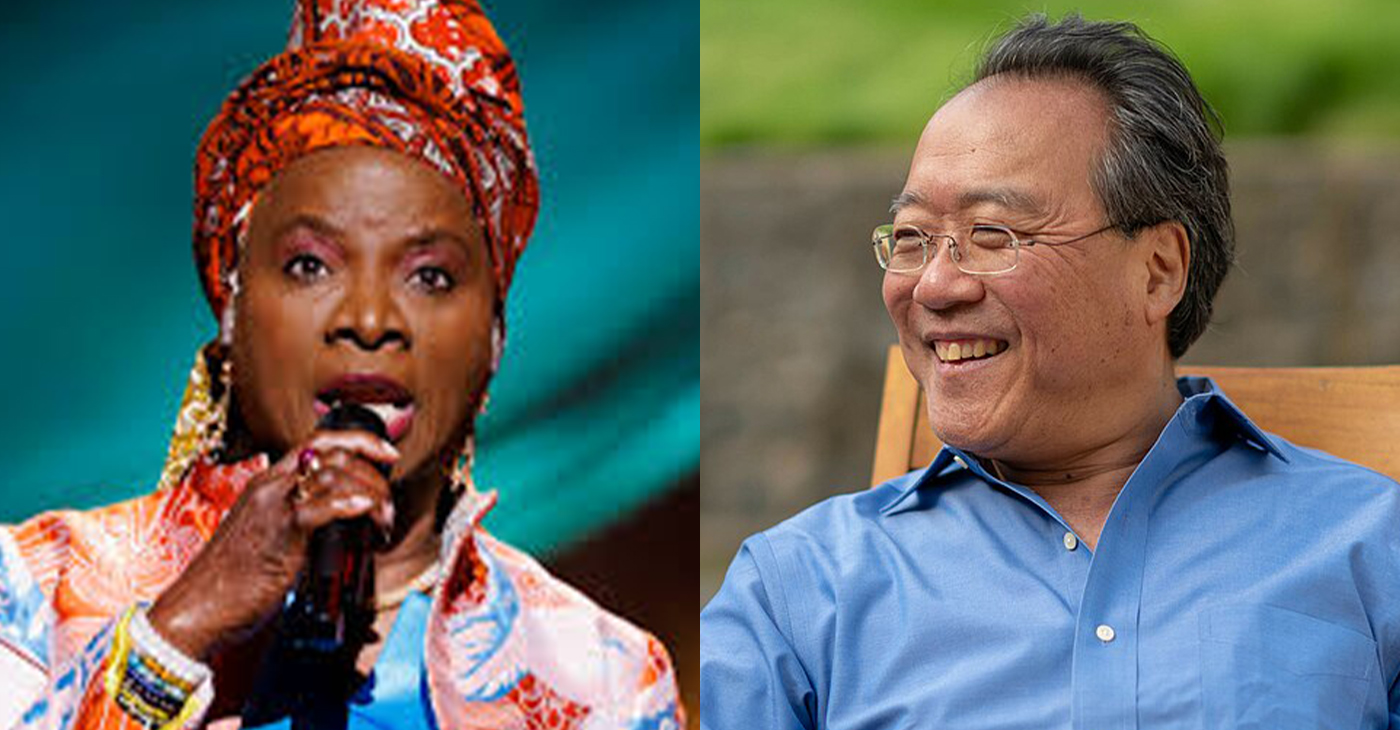Music
Black Violin Breaking Stereotypes One Note at a Time
WASHINGTON INFORMER — The classically trained viola/violin duo of Wil B. and Kev Marcus return to the DMV, inviting us to take a ride with them on a musical journey that will include a modern blend of classical, hip-hop, rock and R&B sounds. They’ll perform with the Maryland Classic Youth Orchestra at the Strathmore, April 9 and 10.
The classically trained viola/violin duo of Wil B. and Kev Marcus return to the DMV, inviting us to take a ride with them on a musical journey that will include a modern blend of classical, hip-hop, rock and R&B sounds. They’ll perform with the Maryland Classic Youth Orchestra at the Strathmore, April 9 and 10.
The celebrated musicians tour the world with over 200 shows a year, collaborating with such superstars as Wu-Tang Clan, Wyclef Jean, Alicia Keys, P. Diddy, Kanye West, 50 Cent, Tom Petty, Aerosmith, Aretha Franklin and The Eagles.
But with the duo connecting with and performing for over 100,000 students each year, it’s obvious that the Florida natives hold education outreach with youth as one of their primary and ongoing goals.
Kev Marcus spoke more about what’s new with Black Violin.
Washington Informer: As two Black men who play violin, I’m sure you and Wil B. have been teased and ribbed a lot. How do you address stereotypes that keep others from going after their dream?
Kev Marcus: We never really set ourselves up to defeat stereotypes. But we believe that when you’re told that you’re too young, or you’re a girl, things like that, we say run toward it — don’t run away from it.
Two Black dudes playing violin — that’s our stereotype that we’re fighting. There will always be other kinds of stereotypes that will need to be broken and we want to shed light on that. Sometimes, breaking those stereotypes is something worth going after because no one else has done so before. For us, Black and classically trained, we through the hip-hop element in too — not so much, however, that our classical roots come in question.
Washington Informer: In your visits to youth across the U.S., what changes are you seeing in arts education?
Kev Marcus: STEAM education in Montgomery County is on a far higher level than in many other parts of the nation. Arts are so important. But ironically, even at the schools where Wil and I received our formative training back in Florida, while they provide classical training, they no longer offer a violin program. They’re still performing arts schools and have band and choir but offer less in terms of classical music training. We just hope our work will help inspire youth — we want to do all we can to push artistic people. And it doesn’t have to be on the violin or even in music. We want youth to have alternatives — options other than mathematics, English or sports. It’s so important to give young people as many opportunities as possible to find themselves. Not everyone is a good reader, an A student. Some have other talents that don’t get enough encouragement. We’ve been involved with talent competitions and performances and have seen some amazingly talented young people.
Washington Informer: What’s on your wish list — your bucket list?
Kev Marcus: I would love to work with Stevie Wonder. The true bucket list guy. Also, we’ve never played Carnegie Hall — not yet … but one day! It’s funny, I was in a barber shop the other day talking to a woman and she asked me about being nervous when I perform. I don’t get nervous anymore. After we were invited to perform for President Obama’s inauguration, I felt like we’d been to the mountain top. Nothing else since then has compared. What an honor and an experience.
Washington Informer: With your feet in both the classical world and the hip-hop world, where have you been earnestly embraced?
Kev Marcus: When we came along, no one was doing what we wanted to do. We wanted to blend the genres without disrespecting either side. But no question, the biggest pushback comes from the classical side today. Some orchestras we play with, they’d put earplug in their ears. Some will say the pop stuff is beneath them. That’s unfortunate. But it hasn’t stopped us. But with the hip-hop world, they always give us much love. We try to prove them wrong but some things and some people never change.
Black Violin will release a yet untitled CD later this year — three of those songs will be performed during their shows next week. On Tuesday, April 2, the duo returned to the Apollo where they got their big break — winning three of their appearances during the 2004-2005 season and then returning to be crowned as the season winner.
For more about them, visit blackviolin.net.
This article originally appeared the Washington Informer.
Arts and Culture
Bring on the Bands: The Roots of African American Music on Stage at Black-Eyed Pea Festival
Grammy-nominated Andre Thierry of Accordion Soul Music, second-line band MJ’s Brass Boppers, the Oakland School for the Arts jazz band, and vocalist Piwai will grace the stage MCed by Dance-A-Vision’s Carla Service, who will help keep you moving.

Andre Thierry’s Accordion Magic, MJ’s Brass Boppers, Piwai and others provide free entertainment
By Post Staff
They’re gonna sing, they’re gonna dance, they’re gonna play accordions and saxophones, drums and trumpets, fifes, washboards, tambourines, and the mbira (also known as kalimba, the African thumb piano) on the stage at the 10th Annual Oakland Black-Eyed Pea Festival (BEPF).
No, not all at once, but that’s what you’ll see and hear over the course of the day at the festival celebrating traditional African and African American music, food, and art on Sept. 13 at Marston Campbell Park at 17th and West streets in West Oakland.
Grammy-nominated Andre Thierry of Accordion Soul Music, second-line band MJ’s Brass Boppers, the Oakland School for the Arts jazz band, and vocalist Piwai will grace the stage MCed by Dance-A-Vision’s Carla Service, who will help keep you moving.

Piwai brings many talents to her music with conga drums as well as the mbira, the African thumb piano. Courtesy photo.
Below is a schedule of the day’s musical line-up:
11 a.m.: The festival opens for shopping, massage, and activities for children.
12-1 p.m.: Led by Zamora, the Wakan Wiya Two-Spirit Drum honors the land and our native forebears. They are followed by a libation and offering to the ancestors through Bata drums and chant in ancient Yoruba by Awon Ohun Omnira.
1:20-2 p.m.: Under the direction of Daniel Parenti, the students in the jazz program at Oakland School for the Arts will bring us jazz from different eras, from classic to smooth.
2:20-3:20 p.m.: Piwai wows audiences across the globe with her soulful voice and genre-fusing melodies. Fondly known as the girl with the African thumb piano, the mbira, Piwai was born and raised in Zimbabwe. As a gwenyambira, Piwai adds authentic cultural elements to her music, making her performances truly unique. Her collaboration on the Grammy-winning album “Last Days of Oakland” showcases her versatility.
3:40-4:40 p.m. Andre Thierry’s accordion soul music fills up the festival’s midafternoon schedule. The Richmond native and Grammy-nominee received high praise from The Washington Post, calling him “A master at pumping out fast, funky rhythms on an instrument not usually associated with earthy syncopation. A versatile student of the music, Thierry can’t be lumped into Zydeco’s old-school R&B-influenced camp or its nouveau, rap-inspired one: He and his band lay down both soulful, traditional slow-dances and bottom-end-booming kinetic groovers.”
5-6 p.m.: MJ’s Brass Boppers’ singing and swinging brass line brings an authentic second-line experience with true New Orleans flair to San Francisco. Founded in 2008 by Michael “MJ” Jones and other NOLA transplants who were trained by family and community, the band rehearses constantly and lives the music, with the second-line beat pulsing through their veins. Seen at private events and street festivals, they’ve opened for a variety of acts, including George Clinton & Funkadelic, The O’Jays, Trombone Shorty & Orleans Ave, Funky Meters, George Porter Jr. and more.
Online sources from the musicians’ web sites were quoted in this report.
The 10th Annual Black-Eyed Pea Festival, a free celebration of traditional African American music, food, and art will be held on Sat. Sept. 13, from 11 a.m. to 6 p.m. at Marston Campbell Park, 17th and West streets in West Oakland. For more info, go to Oakbepf.com or call 510-332-5851. Bring a chair or blanket for the lawn or reserve a table for six for $150 at https://www.tickettailor.com/events/omnirainstitute/1799229
Arts and Culture
Cal Performances Presents Angélique Kidjo & Yo-Yo Ma in Sarabande Africaine at UC Berkeley Greek Theatre on Aug. 30
On Saturday, Aug. 30, the pair will debut the Bay Area premiere of Sarabande Africaine, joined by pianist Thierry Vaton, percussionist David Donatien, and special guest Sinkane. The program illuminates centuries of musical interplay between African traditions and Western classical forms, using the Baroque sarabande dance, and its African ancestor, the Congolese spirit dance Zarabanda, as a gateway to exploring the deep, interconnected roots of global music.

By Carla Thomas
On Labor Day weekend two of the world’s most celebrated musicians and cultural ambassadors, Grammy Award–winning vocalist Angélique Kidjo and legendary cellist Yo-Yo Ma join forces for an evening of music, history, and cultural dialogue at UC Berkeley’s historic Hearst Greek Theatre.
On Saturday, Aug. 30, the pair will debut the Bay Area premiere of Sarabande Africaine, joined by pianist Thierry Vaton, percussionist David Donatien, and special guest Sinkane. The program illuminates centuries of musical interplay between African traditions and Western classical forms, using the Baroque sarabande dance, and its African ancestor, the Congolese spirit dance Zarabanda, as a gateway to exploring the deep, interconnected roots of global music.
Both Kidjo and Ma have built careers not only as great performers but as passionate advocates for cultural understanding. Sarabande Africaine is as much a conversation about shared heritage as it is a musical performance, blending genres, geographies, and histories.
“Every day there are moments when all of us can feel we are on the inside of something and also when we feel we are on the outside of something,” said Yo-Yo Ma. “To be able to understand both at the same time and oscillate between the two gives us a larger perspective on the world.”
“If your mind is open, and there is no fear, it’s easier to listen, and to question yourself,” said Kidjo.
The upcoming performance is presented within Cal Performances’ Illuminations: “Exile & Sanctuary” series for the 2025–26 season. The production explores exile as more than just physical displacement, but a disruption in identity and belonging, while sanctuary represents both refuge and the creative space where new connections and communities can take shape.
Cal Performances’ Illuminations bridges performances with UC Berkeley’s academic research, pairing the arts with conversations about urgent global issues.
Kidjo’s continued partnership with Cal Performances includes her 2021–22 artist-in-residence, premiering her music-theater work Yemandja, set in 19th-century West Africa during the transatlantic slave trade.
She also participated in the Bias in Our Algorithms and Society panel alongside campus leaders like Jennifer Chayes, and joined the Black Studies Collaboratory for a dialogue on music, diaspora, and the world.
She has since returned to Berkeley for multiple performances, most recently in 2024 at Zellerbach Hall.
Yo-Yo Ma’s history with Cal Performances spans decades, beginning in 1997. One notable project includes the 2018 performance of Bach’s complete cello suites at the Greek Theatre, a testament to his devotion to creating “transformative concert experiences in iconic spaces.”
For tickets and more information, visit calperformances.org.
Activism
The Past and Future of Hip Hop Blend in Festival at S.F.’s Midway
“The Music and AI: Ethics at the Crossroads” panel featured X.Eyee, CEO of Malo Santo and senior advisor for UC Berkeley’s AI Policy, Sean Kantrowitz, director of media and content @Will.I.A.’s FYI, Adisa Banjoko of 64 Blocks and Bishop Chronicles podcast, and Julie Wenah, chairwoman of the Digital Civil Rights Coalition.

By Carla Thomas
“Cultural Renaissance,” the first-ever SF Hip-Hop conference, occurred at The Midway at 900 Marin St. in San Francisco on July 18 and 19. Held across three stages, the event featured outdoor and indoor performance spaces, and a powerful lineup of hip-hop icons and rising artists.
Entertainment included Tha Dogg Pound, celebrating their 30th anniversary, Souls of Mischief, and Digable Planets. “Our organization was founded to preserve and celebrate the rich legacy of Hip-Hop culture while bringing the community together,” said SF Hip-Hop Founder Kamel Jacot-Bell.
“It’s important for us to bring together artists, innovators, and thought leaders to discuss how hip-hop culture can lead the next wave of technological and creative transformation,” said Good Trouble Ventures CEO Monica Pool-Knox with her co-founders, AJ Thomas and Kat Steinmetz.
From art activations to cultural conversations, the two-day event blended the intersections of AI and music. Panels included “Creative Alchemy – The Rise of the One-Day Record Label,” featuring producer OmMas Keith, composer-producer Rob Lewis, AI architect-comedian Willonious Hatcher, and moderator-event sponsor, AJ Thomas.
“The Legends of Hip-Hop and the New Tech Frontier” panel discussion featured hip-hop icon Rakim, radio personality Sway, chief revenue officer of @gamma, Reza Hariri, and music producer Divine. Rakim shared insights on culture, creativity, and his A.I. start-up NOTES.
“AI is only as good as the person using it,” said Rakim. “It cannot take the place of people.”
Rakim also shared how fellow artist Willonious helped him get comfortable with AI and its power. Rakim says he then shared his newfound tool of creativity with business partner Divine.
The panel, moderated by the Bay Area’s hip-hop expert Davey D, allowed Divine to speak about the music and the community built by hip-hop.
“Davey D mentored me at a time when I had no hope,” said Divine. “Without his support, I would not be here on a panel with Rakim and Willonious.”
Hatcher shared how his AI-produced BBL Drizzy video garnered millions of views and led to him becoming one of Time magazine’s 100 most influential AI creators.
“The Music and AI: Ethics at the Crossroads” panel featured X.Eyee, CEO of Malo Santo and senior advisor for UC Berkeley’s AI Policy, Sean Kantrowitz, director of media and content @Will.I.A.’s FYI, Adisa Banjoko of 64 Blocks and Bishop Chronicles podcast, and Julie Wenah, chairwoman of the Digital Civil Rights Coalition.
“Diverse teams solve important questions such as: ‘How do we make sure we bring diverse people to the table, with diverse backgrounds and diverse lived experiences, and work together to create a more culturally sound product,’” said Wenah.
Self-taught developer, X.Eyee said, “You have to learn the way you learn so you can teach yourself anything. Future jobs will not be one roadmap to one individual skill; you will be the orchestrator of teams comprised of real and synthetic humans to execute a task.”
Activist Jamal Ibn Mumia, the son of political prisoner Mumia Abu Jamal, greeted Black Panther Party illustrator Emory Douglas, who was honored for his participation in the Black Power Movement. Douglas was presented with a statue of a black fist symbolizing the era.
“It’s an honor to be here and accept this high honor on behalf of the Black Panther Party,” said Douglas, holding the Black Power sculpture. “It’s an art (my illustrations) that’s been talked about. It’s not a ‘me’ art, but a ‘we’ art. It’s a reflection of the context of what was taking place at the time that inspired people.
“To be inspired by is to be in spirit with, to be in spirit with is to be inspired by, and to see young people continue on in the spirit of being inspired by is a very constructive and powerful statement in the way they communicate,” Douglas said.
His work embodied the soul of the Black Panther Party, and as its minister of culture and revolutionary artist, he definitely keeps the Panther Party soul alive, and his work is everywhere.
“Brother Emory Douglas is an icon in the community,” said JR Valrey of the Block Report.
“Fifty years later, he’s still standing,” said Ibn Mumia, raising his fist in the traditional Black Power salute.
“Emory is a living legend and so deserving of this award,” Valrey said. “We have to honor our elders.”
-

 Activism3 weeks ago
Activism3 weeks agoOakland Post: Week of November 12 – 18, 2025
-

 Activism3 weeks ago
Activism3 weeks agoIN MEMORIAM: William ‘Bill’ Patterson, 94
-

 Activism3 weeks ago
Activism3 weeks agoHow Charles R. Drew University Navigated More Than $20 Million in Fed Cuts – Still Prioritizing Students and Community Health
-

 Bay Area3 weeks ago
Bay Area3 weeks agoNo Justice in the Justice System
-

 #NNPA BlackPress3 weeks ago
#NNPA BlackPress3 weeks agoLewis Hamilton set to start LAST in Saturday Night’s Las Vegas Grand Prix
-

 #NNPA BlackPress2 weeks ago
#NNPA BlackPress2 weeks agoBeyoncé and Jay-Z make rare public appearance with Lewis Hamilton at Las Vegas Grand Prix
-

 #NNPA BlackPress3 weeks ago
#NNPA BlackPress3 weeks agoThe Perfumed Hand of Hypocrisy: Trump Hosted Former Terror Suspect While America Condemns a Muslim Mayor
-

 #NNPA BlackPress3 weeks ago
#NNPA BlackPress3 weeks agoTrump’s Death Threat Rhetoric Sends Nation into Crisis

























































